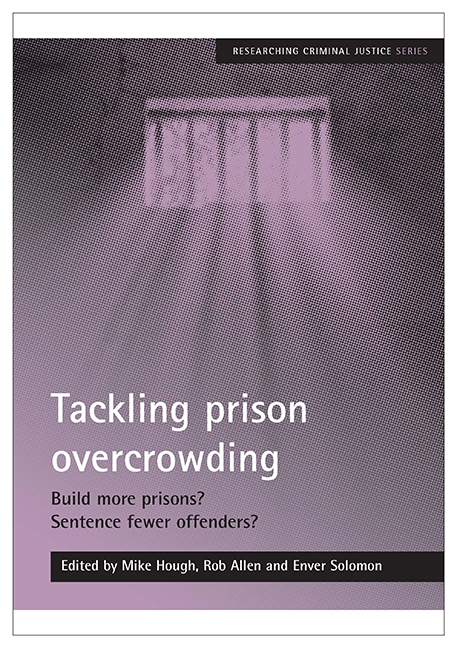Book contents
- Frontmatter
- Contents
- List of figures and tables
- Acknowledgements
- Foreword
- Notes on contributors
- 1 Introduction
- 2 The prisoners’ dilemma in England and Wales
- 3 Building on sand: why expanding the prison estate is not the way to ‘secure the future’
- 4 Towards more consistent and predictable sentencing in England and Wales
- 5 ‘Titan’ prisons: do size, efficiency and legitimacy matter?
- 6 Private punishment? An examination of the expansion, development and employment relations of private prisons
- 7 Reducing the use of custody as a sanction: a review of recent international experiences
- 8 Where now?
- 9 Endnote: latest developments in penal policy
1 - Introduction
Published online by Cambridge University Press: 25 March 2023
- Frontmatter
- Contents
- List of figures and tables
- Acknowledgements
- Foreword
- Notes on contributors
- 1 Introduction
- 2 The prisoners’ dilemma in England and Wales
- 3 Building on sand: why expanding the prison estate is not the way to ‘secure the future’
- 4 Towards more consistent and predictable sentencing in England and Wales
- 5 ‘Titan’ prisons: do size, efficiency and legitimacy matter?
- 6 Private punishment? An examination of the expansion, development and employment relations of private prisons
- 7 Reducing the use of custody as a sanction: a review of recent international experiences
- 8 Where now?
- 9 Endnote: latest developments in penal policy
Summary
This book comprises the proceedings of a symposium held in May 2008 that examined government policy on prisons and sentencing. The event was organised by the three research centres in the School of Law at King's College London: the Centre for Crime and Justice Studies, the Institute of Criminal Policy Research and the International Centre for Prison Studies. It was funded by the Hadley Trust.
The symposium was organised to examine the latest proposals for prisons and sentencing set out in the government's review of prisons by Lord Carter published in December 2007 (Carter, 2007). The report put forward radical recommendations including the creation of a sentencing commission and the construction of large-scale ‘Titan’ prisons. It was felt by the three centres at King's College that these were significant proposals that needed to be subject to debate and independent critique. We therefore organised a symposium for senior criminal justice practitioners, policy officials, academics and voluntary sector staff. The intention was that the symposium presentations and discussions would feed into government deliberations on the proposals in the Carter Report.
Following publication of the report the government published two consultation papers. First, the Ministry of Justice set up a Sentencing Commission Working Group to consider options for a sentencing commission. The Working Group published a consultation paper on a ‘structured sentencing framework and sentencing commission’ inviting responses from interested parties (Sentencing Commission Working Group, 2008); thereafter it set out recommendations to the government, discussed in Chapter 4. Second, the Ministry of Justice published Titan prisons setting out detailed options for developing the model and seeking views on the proposals. Some of the authors in this volume have contributed to the consultations based on the presentations and discussions at the symposium. The most up-to-date position is set out in an endnote.
The event was held at King's College London and participants included the recently appointed Director General of the National Offender Management Service and former Director General of the Prison Service, Phil Wheatley, the Director of Public Prosecutions, Sir Ken MacDonald, the Chief Inspector of Prisons for England and Wales, Anne Owers, and officials from the Ministry of Justice and Treasury as well as academics and representations from criminal justice voluntary sector organisations.
- Type
- Chapter
- Information
- Tackling Prison OvercrowdingBuild More Prisons? Sentence Fewer Offenders?, pp. 1 - 8Publisher: Bristol University PressPrint publication year: 2008



